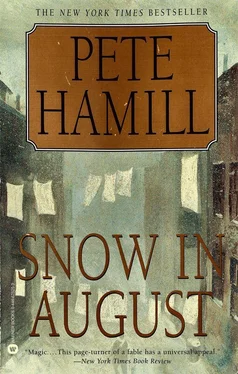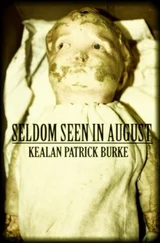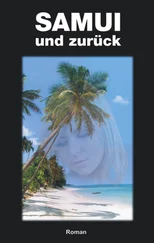One afternoon, Michael squatted down and eased a tall leather-bound book from the bottom shelf of the bookcase. He opened it and saw an illustration of a huge, looming castle, its spires rising into fog. It looked like the place where Dracula lived, in the movie that had sent Michael running for the sunshine one Saturday afternoon from the slithery darkness of the Venus.
“Is this Prague?” he asked, turning the open book to the rabbi. The words were all in Hebrew.
The rabbi slipped his glasses to the tip of his nose.
“Yes,” he said. “Prague.”
He looked at the drawing, then leaned closer.
“That is St. Vitus Cathedral, in Hradčany,” he said. “The Castle.”
“Man, it’s scary-looking.”
“Yes.”
“Was Prague a scary place?”
“Sometimes,” the rabbi said. “In the bad times.” He took the book from Michael, holding it open with both hands. “But also beautiful.”
He laid the open book upon the table.
“Yes,” he repeated. “Beautiful.”
The cleaning stopped now, and the rabbi sat down and tried to explain faraway Prague to the boy from Ellison Avenue. Michael listened as the man talked about how it was on Prague mornings in spring, walking along the banks of the Vltava with the trees budding and the light a pale green. Michael began to visualize the crowds on the bridges in summer. “Always pretty girls, with boyfriends,” the rabbi said. “Priests. Old rabbis…” As he slowly turned the pages, Michael walked with him through the palace where the Hapsburgs stayed when they came over from Vienna. He gazed at the guards who marched outside in polished boots and plumed hats and gold scabbards, even when the kings and queens were gone. He strolled with Rabbi Hirsch through the royal gardens where the Hapsburgs grew their tulips in vast dazzling rows. They peered together at the orange tile roofs and cobblestoned streets and weeping willows of the Mala Strana, at the foot of the Castle on the left bank of the river, and saw the old aristocrats and the rich artists and heard their horses trotting on the wet stones after a summer rain.
Michael went with the rabbi to the 1920s, and the rabbi’s father was with them as they took long walks and heard about history and stopped before houses that were built in the thirteenth century. Imagine: on these very streets, Schiller once strolled with his head full of poems. And there, down that path where the rabbi’s father was pointing, just beyond the gurgling fountains and the beech trees, there are the Waldstein Gardens.
“Waldstein, he was a meshuggener , a crazy man, a general, one of those, how do you… men of destiny?” He smiled. “The Thirty Years’ War, he started with a murder. No: three murders! Three of his enemies he had thrown out from the window in the Castle. But it was a happy ending his story, that you would like. He was killed by an Irisher! A dragoon that put a dagger in his heart!”
“What was an Irishman doing in Prague?”
“Making a living,” the rabbi said. “Killing, in those days, it was a job.”
Then they were together on another street in the Mala Strana, and in that corner house lived the violin makers, and up the street was the Italian Hospital and the Lobkowicz Palace, and Michael imagined nuns in starched white habits moving down bright corridors and a princess walking barefoot on marble floors in the moonlight. And there, that small house? That was where Mozart stayed when he came to Prague for the world premiere of Don Giovanni .
“The first time Don Giovanni I saw,” the rabbi said, “I am your age. I have never seen anything like it ever before. The music. The beauty.”
Michael didn’t know who Mozart was or what Don Giovanni was about, but he listened carefully and pictured the orchestra with the musicians all in tuxedos and the balconies full of powdered women, and chandeliers glittering on the ceiling, like in The Phantom of the Opera with Claude Rains. And there in the crowd, beardless, smaller, his blue eyes wide, was Rabbi Hirsch. Then they were walking together on a weekday along the river in Prague and crossing into the little island young Judah Hirsch said was called Kampa. They were the same age, and they watched the young woman washing clothes on the banks of the river. Or it was Sunday and families held picnics on the grass. There were artists everywhere, a forest of easels pitched along the riverbank, men in berets painting the bridges and the turrets of Charles University across the river, and the sky above them all.
“And the birds,” the rabbi said. “Thousands of birds, getting lunch in the river.”
The rabbi turned a page now and pointed beyond some small houses and told Michael that in the old days there had been a Jewish cemetery there. Then it was dug up and replaced by buildings. Now it was lost to history, the graves and the names of the dead long forgotten.
“The old people, they used to say that the spirits from the lost graves, all the souls, they floated up in the sky forever, trying to get home,” he said. “Now they have plenty of company.”
Michael saw them now, hundreds of them, floating in the air, cartwheeling, swooping, men searching for women, and children searching for parents, high above the spires of St. Vitus, mixed in with Finn MacCool’s lost followers, the fianna , all of them careening like birds, like a lost flock of robins. And as he listened to the rabbi recall his own childhood fears, he was standing in Kampa, watching as the spires detached themselves from the cathedral and slowly rose into the sky and circled Prague, like knobby rockets reaming the air, scattering ghosts and angels and fianna, before driving hard and ferociously through the flock of ghosts into the Jewish Quarter.
The rabbi’s eyes were drowsy with the past, his face loose. And then he was a young man, taking Michael with him into the cellar cafés, the air blue with cigarette smoke, and Mucha posters on the walls full of women with thick coils of hair and red lips, and all of them, Judah Hirsch and Michael Devlin and their friends, talking about naturalism and symbolism. Mallarme and Nietzsche and Rilke. The names meant nothing to Michael as he listened hard, trying to shape the rabbi’s life in his own mind, living it with him.
“This is a time, the first time I try to live without God,” the rabbi said, his eyes drifting to the door that led to the sanctuary. “Is a surprise, a rabbi can try to live without God?”
“Yes,” the boy said.
“We are, were young,” the man said.
He kept talking, as much to himself as to Michael, trying to explain a time in the 1920s when he and his friends and most other Czechs believed that culture would unite them all. Michael didn’t exactly understand the word culture; it made him think of pictures of rich people he’d seen in the Daily Mirror . But the rabbi spoke about a time, in those cellar cafés, when all of them thought that culture would be the cement of Prague, strong enough to bind together Christians and Jews and atheists, men and women, old and young. Culture would end the ancient quarrels of Europe, preventing bloodshed and bitterness and cruelty.
“God we didn’t need,” he said, “if we had Vermeer. Or Picasso. Or Mondrian. On every wall, we had their pictures pasted.”
None of this talk made pictures in Michael’s mind, nor carried him high above the distant city to share the sky with ghosts. But he could see himself with young Judah Hirsch, sitting beside the first radio in a smoky corner of the Café Montmartre on Celetna Street, smoking cigarettes, listening to words coming through the air in other languages. Michael could not tell one language from another but knew that there were Germans speaking, and Slavs, and Austrians and Russians, and he wished that Father Heaney was with them, because he had been to Europe and could help sort them out.
Читать дальше












